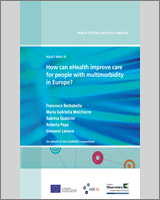NCBI Bookshelf. A service of the National Library of Medicine, National Institutes of Health.
Key messages
- eHealth has the potential to improve care and offer new services for people with multimorbidity. It could allow providers and policy-makers to:
- ○ coordinate and integrate different elements of care better, by improving communication and the sharing of information between professionals and with patients through message systems or electronic EHRs;
- ○ support self-management through tools to provide feedback or check adherence to treatment;
- ○ improve clinicians’ decision-making and the quality of care through decision support systems (DSSs), which help share evidence on dealing with the complexities of multimorbidity;
- ○ monitor and analyse risk to identify the most complex cases and allow proactive responses;
- ○ improve access to health care services for people with multimorbidity in rural and deprived areas through telehealth services or mHealth applications.
- eHealth is not yet a major component in most health systems. If it is to fulfil its potential, policy-makers need to address gaps in regulation and increase standardization in the national and European contexts. This means:
- ○ designing adequate legal and funding frameworks;
- ○ defining standards for and regulation on interoperability of eHealth solutions for remote consultation, monitoring and care;
- ○ fostering standardization of DSSs by care providers at the national level;
- ○ promoting new regulations and frameworks for mobile health solutions for self-management, resolving the uncertain legal status;
- ○ implementing personal health records that are accessible to patients;
- ○ refining and implementing a concrete road map for compatibility and standardization of EHRs, e-referrals, ePrescriptions and health information systems within and between EU Member States.
- Concrete initiatives to extend professional and patient uptake might usefully include personal health records, DSSs and information systems for risk stratification.
- Comprehensive training and educational campaigns will be important in improving the digital health literacy of patients, informal carers and care professionals.
- Large-scale studies are needed to evaluate the impact of eHealth tools (rather than small-scale research, which cannot evaluate effectively).
Contents
About the Series
This report arises from the Innovating care for people with multiple chronic conditions in Europe (ICARE4EU) project, which has received funding from the European Union, in the framework of the Health Programme. The authors wish to thank all country expert organizations and the programmes which participated in the ICARE4EU project. The authors are grateful to the programme managers for sharing information on their programmes.
The authors and editors are also grateful to Julia Wadoux (AGE Platform Europe), Stephanie Carretero-Gomez (Joint Research Centre, Institute for Prospective Technological Studies (IPTS)) and Clayton Hamilton (WHO Regional Office for Europe) for reviewing this publication and contributing their expertise.
All rights reserved. NIVEL and TU Berlin have granted the European Observatory on Health Systems and Policies permission for the reproduction of this Policy Brief.
Address requests about publications related to the ICARE4EU project to:
NIVEL
Dr. Mieke Rijken
P.O. Box 1568
3500 BN Utrecht
The Netherlands
Email: [email protected]
The content of this Policy Brief represents the views of the authors only and is their sole responsibility; it cannot be considered to reflect the views of the European Commission and/or the Consumers, Health, Agriculture and Food Executive Agency or any other body of the European Union. The European Commission and the Agency do not accept any responsibility for use that may be made of the information it contains.

This policy brief is one of a new series to meet the needs of policy-makers and health system managers. The aim is to develop key messages to support evidence-informed policy-making and the editors will continue to strengthen the series by working with authors to improve the consideration given to policy options and implementation.
Box
What is a Policy Brief?
- NLM CatalogRelated NLM Catalog Entries
- A patient as a self-manager of their personal data on health and disease with new technology--challenges for nursing education.[Nurse Educ Today. 2015]A patient as a self-manager of their personal data on health and disease with new technology--challenges for nursing education.Hopia H, Punna M, Laitinen T, Latvala E. Nurse Educ Today. 2015 Dec; 35(12):e1-3. Epub 2015 Aug 28.
- Review How to improve care for people with multimorbidity in Europe?[ 2017]Review How to improve care for people with multimorbidity in Europe?Rijken M, Struckmann V, van der Heide I, Hujala A, Barbabella F, van Ginneken E, Schellevis F, Richardson E, Van Ginneken E. 2017
- Review European Commission activities in eHealth.[Int J Circumpolar Health. 2004]Review European Commission activities in eHealth.Olsson S, Lymberis A, Whitehouse D. Int J Circumpolar Health. 2004 Dec; 63(4):310-6.
- eHealth in integrated care programs for people with multimorbidity in Europe: Insights from the ICARE4EU project.[Health Policy. 2018]eHealth in integrated care programs for people with multimorbidity in Europe: Insights from the ICARE4EU project.Melchiorre MG, Papa R, Rijken M, van Ginneken E, Hujala A, Barbabella F. Health Policy. 2018 Jan; 122(1):53-63. Epub 2017 Aug 12.
- Review How to support integration to promote care for people with multimorbidity in Europe?[ 2017]Review How to support integration to promote care for people with multimorbidity in Europe?Hujala A, Taskinen H, Rissanen S, Richardson E, van Ginneken E. 2017
- How can eHealth improve care for people with multimorbidity in Europe?How can eHealth improve care for people with multimorbidity in Europe?
Your browsing activity is empty.
Activity recording is turned off.
See more...
